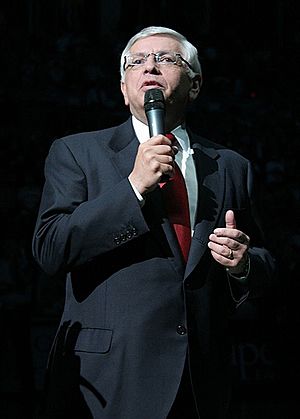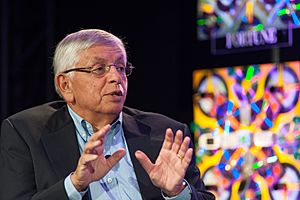David Stern facts for kids
Quick facts for kids
David Stern
|
|
|---|---|

Stern in 2007
|
|
| 4th Commissioner of the NBA | |
| In office February 1, 1984 – January 31, 2014 |
|
| Deputy |
|
| Preceded by | Larry O'Brien |
| Succeeded by | Adam Silver |
| Personal details | |
| Born |
David Joel Stern
September 22, 1942 New York City, U.S. |
| Died | January 1, 2020 (aged 77) New York City, U.S. |
| Spouse |
Dianne Bock
(m. 1963) |
| Children | 2 |
| Alma mater | Rutgers University (BA) Columbia University (JD) |
| Profession |
|
David Joel Stern (September 22, 1942 – January 1, 2020) was an American lawyer and business leader. He was the commissioner of the National Basketball Association (NBA) from 1984 to 2014. Stern helped the NBA grow into one of the world's most popular sports. He is known for making the NBA more popular, especially around the world. He did this by setting up training camps, playing exhibition games, and bringing in more international players.
Under Stern's leadership, the NBA opened 12 offices outside the United States. NBA games were also broadcast in over 200 places and in more than 40 languages. Stern also helped start the Women's National Basketball Association (WNBA) and the NBA G League, which is the NBA's development league. During his time, the NBA also launched its online presence with NBA.com, NBA TV, and NBA League Pass. He also created NBA Cares, a program for social responsibility.
Stern first worked with the NBA in 1966 as an outside lawyer. He then joined the NBA in 1978 as general counsel. In 1980, he became the league's executive vice president. He became commissioner in 1984, taking over from Larry O'Brien. Stern retired in 2014 after 30 years. He was the longest-serving commissioner in major North American sports. He was later added to the Naismith Memorial Basketball Hall of Fame and the FIBA Hall of Fame.
Contents
Early Life and Education
David Stern was born in Manhattan, New York City, on September 22, 1942. He was one of three children in a Jewish family. He grew up in Teaneck, New Jersey. His father ran a Jewish deli in Manhattan. Stern was a big fan of the New York Knicks basketball team. He often went to games with his father.
After finishing Teaneck High School in 1959, Stern went to Rutgers University. He earned a degree in history in 1963. Then, he went to Columbia Law School and received his law degree in 1966.
Working with the NBA
Early Career
After law school, Stern joined a law firm that worked with the NBA. He helped the league settle an important lawsuit brought by star player Oscar Robertson. This settlement allowed the NBA to merge with the American Basketball Association (ABA). It also let players become free agents for the first time. This meant players could choose which team to play for after their contract ended.
In 1978, Stern joined the NBA as general counsel. By 1980, he was promoted to executive vice president. In this role, he was in charge of marketing, television, and public relations for the league. During this time, Stern helped create two important agreements with the NBA Players' Association. One was for drug testing, making the NBA the first major sports league in North America to have such a policy. The other was for a salary cap. This cap created a system where players received 53 percent of all revenues. These agreements made Stern very respected within the NBA.
NBA Commissioner
On February 1, 1984, David Stern became the NBA Commissioner. He took over when the league was facing challenges. Stern decided to focus on marketing the league's star players instead of just the teams. Players like Magic Johnson, Larry Bird, and Michael Jordan became very famous. Michael Jordan's arrival, especially, brought a lot of new attention and money to the NBA. His talent and shoe deals with Nike helped the league become even more popular.
Stern helped the league grow from having fewer viewers to becoming a global sport. In his first year, he sold the rights to air weekly NBA highlights in Argentina for only $2,000 a year. In 1987, he started sending video tapes of games from his New York office to China's state TV station. This helped the league reach beyond North America. Stern also pushed for professional players to be allowed in the Olympics. This led to the famous 1992 U.S. Olympic team, known as the "Dream Team." This team helped make NBA players famous around the world.
Magic Johnson was one of the Dream Team members. A year before the Olympics, he announced he had HIV and was retiring. At that time, many people were scared of HIV. But Stern supported Johnson and allowed him to play in the 1992 NBA All-Star Game and later for the Dream Team. Stern learned about the virus from medical experts and helped teach team owners, players, and the public about it. The NBA also put rules in place to prevent infections during games.
In 1995, the NBA expanded into Canada, adding the Toronto Raptors and the Vancouver Grizzlies. During Stern's time, seven new teams joined the NBA. This brought the total number of teams in the league to 30 by 2004.
In 2000, the Minnesota Timberwolves team was found to have broken rules by secretly promising a player, Joe Smith, a bigger contract later on. The NBA punished the team by canceling the last year of Smith's contract, fining the team $3.5 million, and taking away their next three first-round draft picks.
Before the 2005–06 season, the NBA announced a new dress code. This rule stopped players from wearing certain items like headphones, chains, and sleeveless shirts during public NBA events. Some players, like Allen Iverson, felt the rule was aimed at players who dressed in a hip-hop style. However, years later, this rule was seen as helping NBA stars develop a high-fashion style.
Stern also supported a minimum age limit for NBA players. Starting with the 2006 NBA draft, players had to be at least 19 years old to be drafted. This meant players could no longer be chosen straight out of high school.
For the 2006–07 season, the NBA tried a new "microfiber" basketball. Many players did not like the new ball, saying it felt cheap and caused cuts on their fingers. Even though Stern first refused to change it back, the players' union complained. On December 11, 2006, the NBA announced they would switch back to the old leather ball.
Stern's time as commissioner also saw six NBA teams move to different cities.
In the summer of 2011, the NBA had a lockout. This meant games were canceled for the second time in the league's history due to disagreements between owners and players. Stern was known as a tough negotiator during these times.
On December 8, 2011, Stern stopped a trade that would have sent Chris Paul to the Lakers. A spokesman said it was for "basketball reasons." This decision caused a lot of discussion among fans and players.
On October 25, 2012, Stern announced he would step down as commissioner on February 1, 2014. He had served for 30 years. His deputy, Adam Silver, took over as commissioner. Stern remained connected to the league with the title of commissioner emeritus.
Stern received the Olympic Order in 2012. In 2014, he was added to the Naismith Memorial Basketball Hall of Fame. In 2016, he became a member of the FIBA Hall of Fame.
Personal Life and Death
David Stern was married to Dianne Bock Stern. They had two sons, Eric and Andrew. They lived in Scarsdale, New York. Stern was about 5 feet 9 inches tall.
On December 12, 2019, Stern suffered a brain hemorrhage and had emergency surgery. He passed away in Manhattan on January 1, 2020, at age 77. To honor Stern, all NBA teams wore black bands on their jerseys for the rest of the 2019–20 season. Many basketball legends, including LeBron James, Michael Jordan, Magic Johnson, and Kobe Bryant, shared their sadness about his death.
Images for kids
See also
 In Spanish: David Stern para niños
In Spanish: David Stern para niños
 | Calvin Brent |
 | Walter T. Bailey |
 | Martha Cassell Thompson |
 | Alberta Jeannette Cassell |




